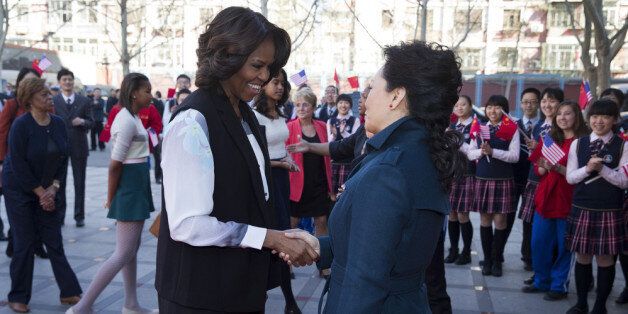As Michelle Obama began her much-anticipated visit to China on Thursday, Chinese netizens reacted with giddiness at the impending “fashion showdown” with her Chinese counterpart, Peng Liyuan, the widely beloved wife of Chinese President Xi Jinping. By mid-day Friday there, the Chinese transliteration of “Michelle” was among the top 10 search terms on Sina Weibo, the country’s most popular micro-blog platform, and much of the discussion centered around Obama and Peng’s first meeting.
“As Michelle prepares to visit China at the end of March, the preliminary rounds in the fashion contest between these two first ladies are finally over,” read one article published last week in the Chinese version of the fashion magazine Self.
Just as Obama’s fashion choices have drawn widespread attention (and plenty of praise) in the U.S., what Peng pulls out of her closet can send outfits and accessories flying off shelves in China. Chinese media and netizens have peppered micro-blogs with pictures comparing similar outfits worn by the two women, breaking down the imagined competition into the “long coat showdown,” the “white top showdown” and several more.
Scheduled for one week, Obama’s trip to China has been billed as a strictly non-political affair. During her time in the three major cities of Beijing, Xi’an and Chengdu, the first lady will focus on education and cultural exchange between the two countries. She is traveling with her two daughters, Sasha and Malia, as well as her mother, Marian Robinson. Peng will be playing host for part of the trip, showing her guests around Beijing and taking Obama on tours of local middle schools.
Peng has captured the hearts of many Chinese women accustomed to Chinese first ladies who have remained virtually invisible in recent decades. She is independently famous of her husband, having won national acclaim as a singer of patriotic songs in China’s People’s Liberation Army in the 1980s. She has taken the spotlight where recent Chinese first ladies shied away.
The two first ladies’ first full day involved a trip to the Forbidden City, the former imperial palace, as well as a Beijing middle school. Reactions to Obama’s outfit — black pants paired with a white blouse and black vest — were muted. Peng’s outfit — high heels and black tights with a long blue skirt and matching jacket — garnered the expected praise.
“Our lady Peng is a true fashionista,” one fashion-obsessed netizen from Guangzhou wrote on Sina Weibo. “Wearing high heels for a stroll around the Forbidden City? I salute you!”
While Obama’s early outfit didn’t win many admirers, she has won many fans among strong and career-oriented women. In a country where unmarried women in their late 20’s are often derisively referred to as “leftover women,” the U.S. first lady scores major points for her assertiveness and early career success.
“I really like Michelle. I get a good feeling from the way she looks really intelligent and also fashionable,” one Sina Weibo user from Beijing wrote. “Even though she doesn’t fit eastern standards of beauty, when she stands next to her husband she doesn’t look at all out of her league. She almost looks just a little bit stronger.”
In one article earlier this week on Phoenix Fashion titled “Michelle Obama points the road ahead for strong Chinese women,” the author shamed Chinese women for being afraid to put on the kind of muscle that Obama has shown on fashion magazine covers.
“Chinese women are so afraid of muscles,” the author opined. “They’ll run a few strides but then fear calf muscles will show up. You give them a barbell and they’re terrified of developing arm muscles. When Michelle Obama made the cover of Vogue, what struck people most were her gleaming biceps. Truly strong women don’t fear muscles.”
Despite her popularity, Obama’s reputation was slightly tinged in the eyes of many Chinese by her husband’s meeting with the Dalai Lama at the White House in February. Chinese government officials and nationalist citizens frequently denounce the Tibetan spiritual leader as a violent separatist and warn heads of state against meeting with him.
Though Obama is not expected to make any explicit political statements, she is scheduled to eat lunch at a Tibetan restaurant in Chengdu, an area that has seen considerable unrest among ethnic Tibetans. That plan stirred emotions among Chinese netizens, with some making racist comments about the first lady and saying “it’d be best if Peng Liyuan keeps her distance from her.”
But those commenters remained a small minority in comparison to those excited to see the two leading ladies in action together. After touring the Forbidden City, Peng gave Obama a short lesson in Chinese calligraphy, teaching her to write a character and giving her a gift of her own calligraphy.
“First lady diplomacy can be an important method for bringing together China-U.S. relations,” one commenter wrote on the People’s Daily Internet forum. “It plays an important role in keeping up the development of friendly relations between the two countries.”




